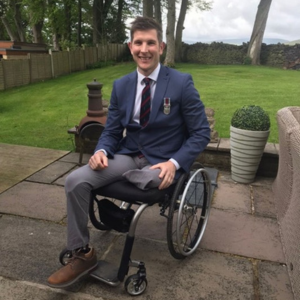
This Armed Forces Day, Gregg Stevenson shares his journey from soldier, to Paralympian, to helping fellow veterans.
Gregg joined the army aged 19, serving in the Royal Engineers, 59 Commando.
Following in his dad’s footsteps, the army was always something Gregg had considered as a career.
“I went to the local college and knew it wasn’t right for me,” he explained.
“I joined the army in 2006 and it was everything I had been searching for. I’d often felt like I didn’t fit in but the army gave me a sense of belonging and a chance to be with like-minded people. It gave me a real purpose and the adventure I needed.”
Gregg was in Afghanistan on his first tour when his time in the army was cut short.
He stepped on an explosive device in Helmand Province and lost both his legs.
He said: “I prided myself in being able to maintain the fitness needed to be a soldier but that was too difficult as an amputee. I had been in the army for six years before the accident and had to start the process of medical discharge.”
The period after Gregg was discharged was a difficult one.
“I saw the army as something I would do long-term, so it came as a real shock.
“My mental health took a decline, I was depressed and had PTSD. I was lethargic and found small things difficult. I didn’t have the energy to leave the house which led to me feeling isolated.
“It took me a year or so to come to terms with leaving the armed forces.”
With support from his wife, his family and military charities, Gregg started to get back on track.
“I started going back to the gym and being active,” he said. “I was more motivated and my self-esteem improved.
“I didn’t think it would be possible to get back to doing what I used to do, but my disability just gave me different opportunities. I started to feel like the old me again.”
Gregg wanted to share his new-found motivation with others and did a level 2 gym qualification. This led to a job with Lancashire Teaching Hospitals as the gym manager at its Specialist Mobility Rehabilitation Centre, where he helped many military amputees and wheelchair users.
“A lot of people at the centre were in the place I had been a few years before,” Gregg said.
“They had poor sleep and were using unhelpful coping strategies such as smoking or alcohol. I saw them in very similar cycles to me.”
In this role, Gregg became more and more passionate about supporting others and he started becoming more interested in mental health.
As his interest in mental health was increasing, Op COURAGE was being established. Op COURAGE provides specialist care and support for those due to leave the armed forces, reservists and those who have already left. It has been developed by veterans, for veterans.
Gregg worked in the service as a Veteran Liaison Support Officer, progressing to become a mental health practitioner.
Then, he decided to pursue his dream of joining the Paralympic rowing team. Rowing is something Gregg discovered after sustaining his injuries.
He has since become the World Champion and two times European Champion and will be competing at the Paralympics in Paris later this year.
In January 2024, Gregg started a job as lived experience lead with Cumbria, Northumberland, Tyne and Wear NHS Foundation Trust (CNTW).
His role is to make sure Op COURAGE is working for service users.
“I liaise with veterans who experience mental health challenges in the community, looking at what could be done better and where we’re having success.
“We look to identify barriers veterans may face in accessing mental health care and how to address those barriers,” he explained.
“The NHS is similar to the military in a way. It has that rank structure with very diverse roles and you have a shared purpose and defined goal. You’ve got a team working to achieve something, which I like.”
Gregg says support for veterans has improved massively since his discharge in 2012.
“The support from military charities was great. Physical disabilities was better at that time but mental health needed to catch up. It’s come so far now, the fact the NHS has a specific service for veterans to receive support and a service that understands the challenges and traumas is great.
“I’m incredibly honoured to bring my experience to this role and I’m excited to develop it further to ensure we continue to support the mental health of our veterans and their families.”
There are many ways CNTW supports the armed forces community.
CNTW is a Veteran Aware Trust, recognising its commitment to improving NHS care for veterans, reservists, members of the armed forces and their families.
The Trust has also signed the Armed Forces Covenant, which is about fair treatment, removing disadvantage and ensuring veterans get the same access to services.
Part of this work involves encouraging more people from the armed forces community to join CNTW’s workforce. CNTW and NTW Solutions hold the Gold Award from the MOD’s Employer Recognition Scheme which publicly recognises employers’ efforts to support the armed forces.
CNTW provides specialist mental health services for former armed forces personnel experiencing severe mental health problems.
If you, or someone you know, is an armed forces veteran and struggling with their mental health, expert help is available. Speak to your GP or contact Op COURAGE on 0300 373 33 22 or email [email protected]
